The Suicide of Europe - Prof. Dr. Ingrid Detter de Frankopan/amp
HUMAN SYNTHESIS
email: humansynthesis0@gmail.com
#The Suicide of Europe by Prof. Dr. Ingrid Detter de Frankopan
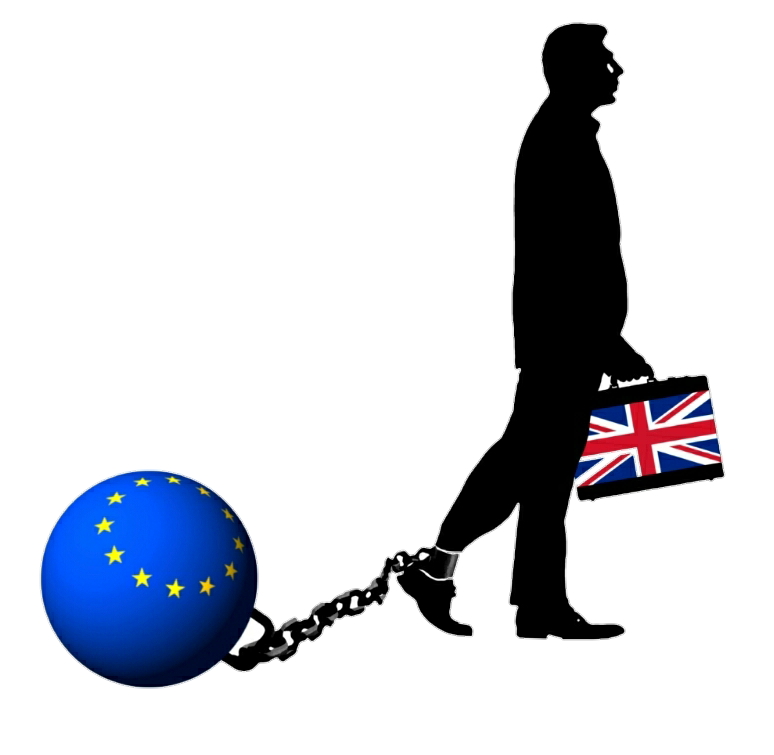
D.Phil.(Oxon); Lic.en droit (Paris); Dipl.EU.Law (Turin), Former Fellow of St Antony's College and Lady Margaret Hall, Oxford, Barrister-at-Law; Lindhagen Professor Emeritus of International Law
© Ingrid Detter de Frankopan - Montesa Jagellonica 2016
ISBN 978-83-63887-01-8
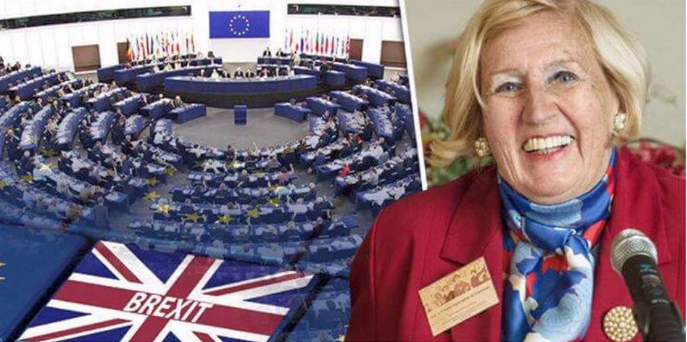
Proff. Ingrid Detter de Frankopan
Table of Contents
Introduction 11
I. The Origins and Development of the EU 14
- To Prevent War 14
- Then, the Diversion to ‘the Market’ 15
- One Organisation: the Merger Treaty 17
- Uncontrolled Expansion 17
II. The Apocalypse of the European Union 20
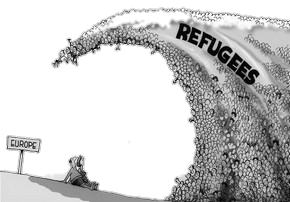
- The Migration Scandal 20
- The EU ‘Mobility’ and ‘Neighbourhood’ Schemes 21
- ‘Welcome to the EU’ Policy 25
- AENEAS Migration Scheme 30
- TPMA Financing Scheme 30
- The EU Commission's Migration Financing Scandal 32
- Peace and Security? 34
- The Schengen Agreement 35
- Open Outer Borders 36
- Outer Borders Even Further Away? A Wider Europe? 38
III. The Supranational EU 39
- Breaking the Nations: EU versus the Nation States 39
- The Reduction of Democracy: The TTIP 40
- False Promises: Subsidiarity and Proportionality 42
- Supranational Powers of the EU 43
- Supremacy over National Rules 46
- The Meaning of ‘Integration’ 48
- Inter-governmental Co-operation 49
- The Price of Membership 50
- Actual Help to Member States 51
- The Happy Odd Non-Member 52
IV. The EU Identity 53
- The European Flag and the EU Emblem 53
- The European Anthem 53
- The European Passport 55
- ‘Europe Day’ 56
- Euronews 57
- Other Schemes: The Euro Lottery, Sports Events, Books 57
- The Made in EU Row: The Label 58
- Europol 58
- Eurojust 59
- The European Police College 59
- The EU College for Diplomats 59
- The European Institute for Public Administration 59
- New ‘European Parties’ 60
- Dishonest Attribution: ESA, OSCE, NATO and Council of 60
Europe - The EU Information Offices 62
- EU Propaganda for a ‘European identity’ 62
Polish interview with Prof. Dr. Ingrid Detter Frankopan:
V. What is Wrong with the EU? 63
- The Main problem: the Commission 63
- The Selection Criteria: Independence 64
- Other Conflicting Activities? 64
- Lack of Qualifications? 66
- Openness and Honesty? 67
- The Position of the President 69
- Bad Judgment? 69
- The Committee System in the EU Commission 70
- Zest for Over-Regulating 71
- Corruption Scandals and Fraud 74
- Hopes for a ‘Better World’? 76
- Not a ‘Better World’ but Further (and worse) Scandals: 77
Eurostat - Other Mismanagement of Funds by the Commission 82
- The EULEX Corruption Scandal 80
- Even More Corruption in the EU Commission 85
- Financial Abuse in the Committee of the Regions 88
- Financial Abuse in EU Info Centres 88
- Fraud by Persons Outside the EU Helped by EU Officials 89
- Ineffective Anti-Fraud Reforms 92
- Corruption in the Accession States 93
- Reminder of ‘Ethical Standards for the Commission’ 96
VI. Whistle-Blower Scandals 96
- It is Dangerous to be a Whistle-Blower in the EU:
The ECSC 96 - Whistle-Blowers: The EU Commission 97
- Whistle-Blowers: More About The Eurostat Scandal 98
- Whistle Blowers: The Court of Auditors 99
- Whistle Blowers: Committee of the Regions 100
- Whistle Blowers: The EU Parliament 101
- Attack on the Freedom of Speech of a Whistle-Blower 101
VII. The Opaque EU 102
- Lack of Transparency: Basic Texts and Official Acts 104
- Lack of Transparency: The Budget 107
- Lack of Transparency: Rules on Immunity 108
- Lack of Transparency: EU Military Forces and EU Police 110
- Lack of Transparency: International Negotiations 110
- Lack of Transparency: The TTIP 110
VIII. The Convoluted and Amorphous EU 111
- The EU Jargon 111
- Madness? 112
- Institutional Defects 112
- The EU Parliament: Fake Democracy 114
- Bureaucracy 116
- The Urge to Mushroom and Spend Money 117
- Languages 117
IX. EU: The Big Spender 118
- Budget: How Money is Raised 118
- ‘Own Resources’: VAT as Direct Taxation 118
- Other ‘Own Resources’: More Direct Taxation 119
- The Vast Expenditure 120
- Disproportionate Spending: The EU’s HQ 121
- Waste: Moving the EU Parliament to Strasbourg Every Month 122
- Budget Limits? 123
- Overspending: The Common Agricultural Policy – CAP 123
- Inner Policies: State Aid versus EU Aid 125
- The Controversial Ryanair Decision 126
- Competition: Market is all that Matters 127
- The Paradox of Competition: State Aid and Mergers 128
- Policies: The Euro Stability Pact & the Euro Stability Row 128
X. The Commission's Antagonism 129
- Commission versus the Member States 129
- Commission as the Fierce Headmaster 131
- The Commission: A Bad Loser? 132
- Cheating the Accession States 132
- Commission versus Fishermen 133
- Commission versus Environment 134
XI. External Relations: Trade and Foreign Policy 135
- Trade 135
- Political Foreign Policy 135
- Interference Here and There 137
- The Long Arms of the EU 138
- More Antagonism: EU versus the United States 139
- More Antagonism: EU versus Russia 145
- Occasional Antagonism: Relations with China: 148
Sometimes For - Sometimes Against - More Antagonism: The EU versus Israel 150
- More Antagonism: EU versus Switzerland 150
- More Antagonism: EU versus Norway 150
- EU versus Democracy and Human Rights 152
- Foreign Policy: Disagreement on Libya 150
- EU versus The Developing World 153
- Anti-WTO Policies 154
- Bureaucracy: Foreign Policy Level 157
XII. Growing Anti-EU Feelings 159
- Germany 160
- Austria 161
- Italy 161
- The Netherlands 162
- Sweden 162
- Ireland 162
- Visegrad States: Poland, Hungary,
The Czech Republic and Slovakia 160
XIII United Kingdom: BREXIT and Cameron's ‘Non-Deal’ 164
- The lack of jus representation is 165
- A ‘Treaty’ or a ‘Binding Decision’ Imputable to the EU? 166
- The Treaty-Making Power of the EU 167
- The Prime Minister's Proposal is Conditional and Dependent 168
on Strict Conditions - There is No Binding Engagement of the EU 169
- The Proposal Violates Two Fundamental Rules of the EU 170
a) The Rule of Free Movement of Persons 171
b) The Rule of Non-Discrimination 171 - The Proposal Attempts Revise the Lisbon Treaty 171
XIV. A New Europe? An Inter-Governmental Single Market? 173
- Geographical and Functional Limits of the Mandate 173
- Responsibility and Competence of Leaders 174
- Abolition of Extensive Immunity of Officials 174
- Prohibition of Political Activities of Leaders 175
- Increased Transparency 173
Conclusions 174
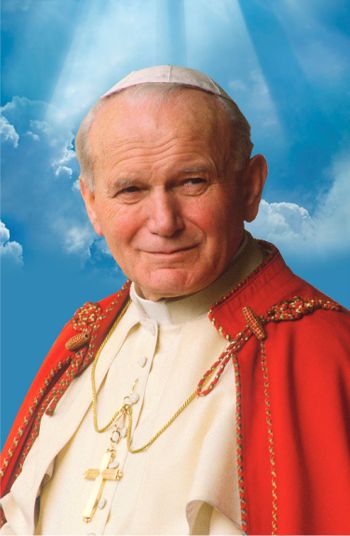
"Do not be afraid!
Pope St. John Paul II"
Introduction
It will be a historic vote on 23rd June 2016 in the United Kingdom: do the
citizens of the United Kingdom wish to grasp the unique (and perhaps
only) opportunity to free themselves from the clutches of the European
Union, an organisation run by unelected, unqualified and unaccountable
bureaucrats? History will tell.
An eye-opener may be the decision of the Swiss Government on 3rd
March 2016 to withdraw the application to join the European Union.1 The
National Council, the Lower house of the Swiss Parliament, voted by 126
to 46, to formally withdraw the application, 24 years after the country first
applied for membership of what was then the European Community (EC).
The withdrawal motion will later go to the Council of States but this is
expected to be a mere formality in view of what the Upper House has
indicated. The main reasons as stated were that Switzerland could not
agree to abandon its independence and Switzerland could never accept
that the Court of the EU would take priority over the Swiss Supreme
Court.
Switzerland had in earlier negotiations asked if the European Union
planned to become ‘supranational’ and develop into the ‘United States of
Europe’. The answer had been that that was not the plan ‘in the short
term’, an answer that made the Swiss interest wane.2
The representative of the Swiss People’s Party, Mr Lukas Reimann,
proposing the motion, stated in 2016 that it was high time to formally
withdraw the application and that Switzerland should no longer be treated
as a country that wants to join the EU. He also gave a good-luck message
to the people of Britain who wish the quit the EU bloc:
‘This is a clear and historical message from the Swiss Parliament to British
voters.
We wish you the best of luck for Brexit. These days, Switzerland is called
Britzerland because Swiss people support the BREXIT’.
Biography of Proff. Ingrid Detter de Frankopan
The Dark roots of the Brussels EU
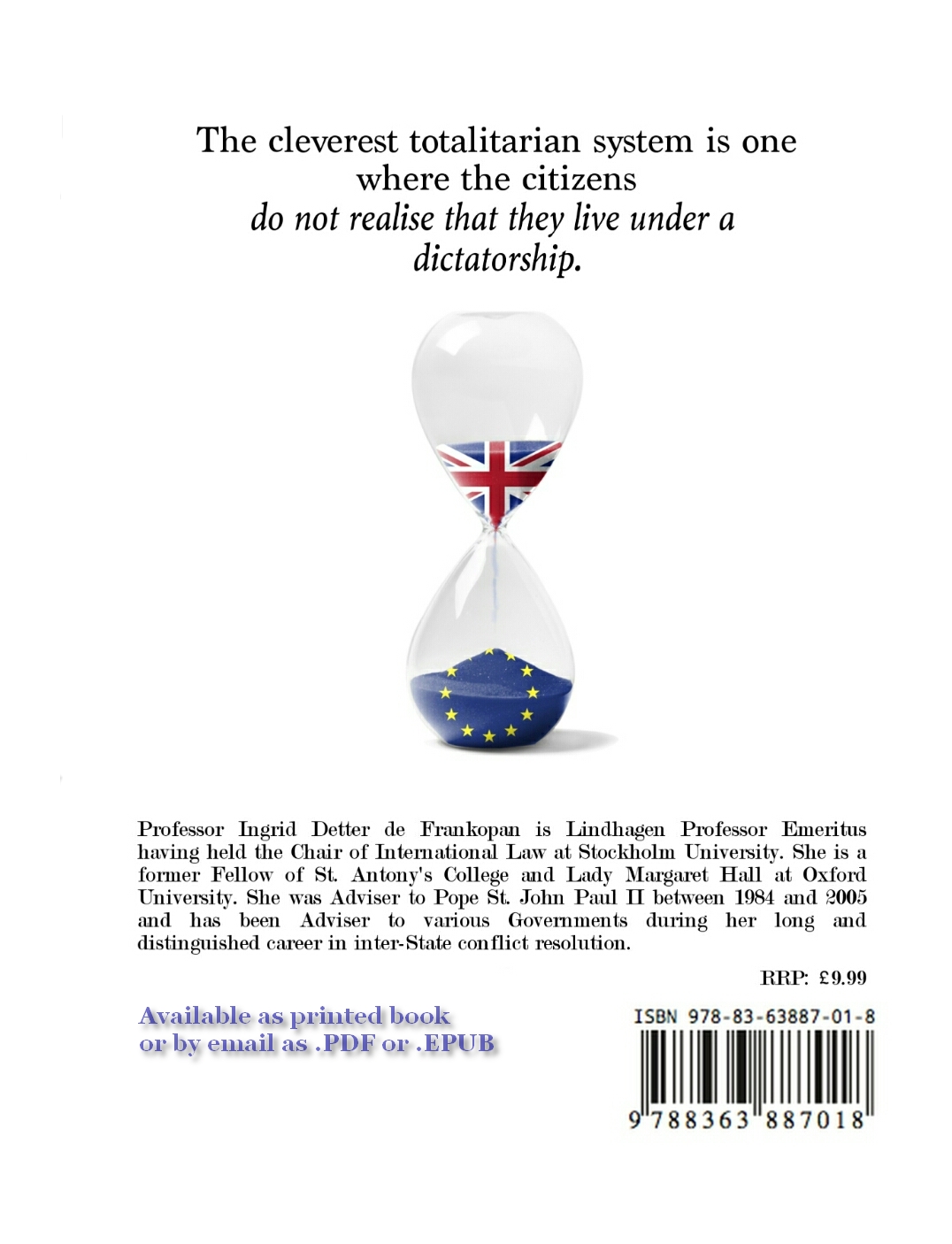
WHO and WHAT is behind it all ? : >
Commentary:
The video and links at the end are not part of the book.
Administrator
HUMAN SYNTHESIS